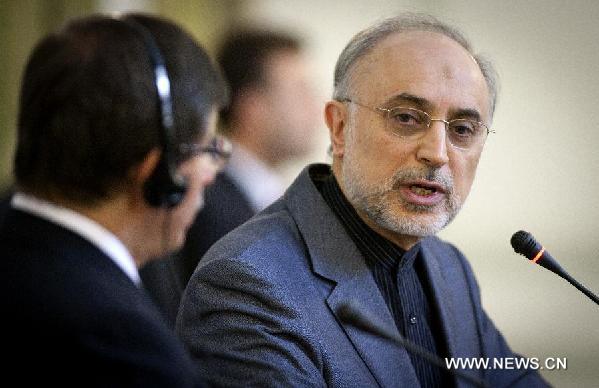Iran says ready for nuclear talks
 0 Comment(s)
0 Comment(s) Print
Print E-mail
Xinhua, January 6, 2012
E-mail
Xinhua, January 6, 2012
Iran's Foreign Minister Ali-Akbar Salehi said here on Thursday that the Islamic republic of Iran is ready to resume nuclear talks with G5+1 (five permanent members of the United Nations Security Council plus Germany).
 |
|
Iran's Foreign Minister Ali-Akbar Salehi (R) talks during a joint press conference with his Turkish counterpart Ahmet Davutoglu in Tehran, Iran, Jan. 5, 2012. [Xinhua] |
The Iranian foreign minister made the remarks at a joint press with his visiting Turkish counterpart Ahmet Davutoglu. Salehi said that the talks could start after both sides agree on the time and venue of the talks.
Salehi said Turkey has announced its readiness to host the new round of talks with the world's powers, adding that "Of course my personal opinion is that Turkey is the best place for the talks but it depends on the both sides to decide on the venue."
Salehi also said that the expansion of ties between Iran and Turkey would help regional peace and stability.
On Wednesday, Iran's Foreign Ministry spokesman Ramin Mehmanparast told Xinhua that Iran is awaiting the European Union's suggestion on the time and venue of the talks.
"We are ready for the talks. We have always said that we are ready for the talks and have always pointed out that the talks should aim at cooperative issues between (the sides), that is, to decide to talk for cooperation instead of confrontation," said Mehmanparast.
The West suspects that Iran's uranium enrichment may be aimed at producing nuclear weapons, a claim denied by Iranian officials.
Nuclear talks between Iran and the G5+1 in Istanbul in January 2011 failed to reach any agreement as Tehran rejected any notion of suspending enrichment in exchange for trade and technology benefits, as called for by several UN Security Council resolutions passed since 2006.
Relations between Iran and the West further deteriorated recently following a series of incidents. Those included Iran's alleged role in a plot to assassinate the Saudi Arabian ambassador in Washington, attacks on the British Embassy in Tehran, the latest International Atomic Energy Agency (IAEA) report on the Iranian nuclear program and disputes over a U.S. drone captured by Iran.






Go to Forum >>0 Comment(s)